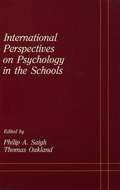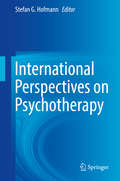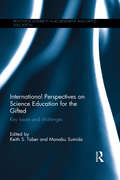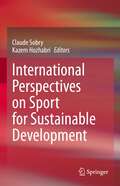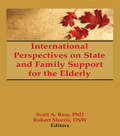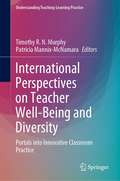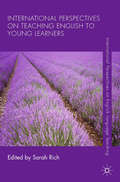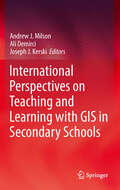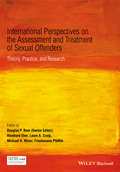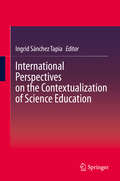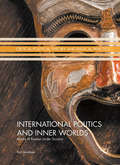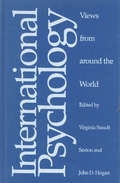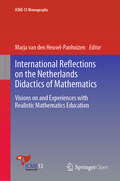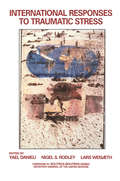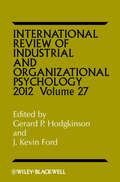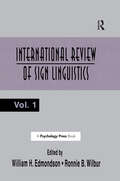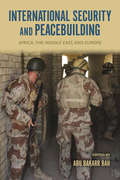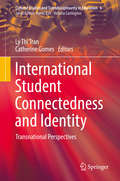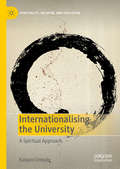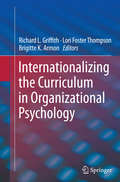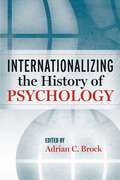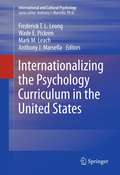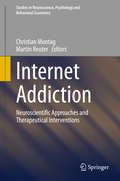- Table View
- List View
International Perspectives on Psychology in the Schools (School Psychology Series)
by Philip A. Saigh Thomas OaklandTo promote a broader understanding of the increasingly important role of school psychology in educational systems throughout the world, the editors of this volume collected the works of leading international educators and authorities. Using research from 24 countries, the book provides current information on educational systems and training facilities, psychology services, educational contributions to society, and directions for shaping children's futures through education.
International Perspectives on Psychotherapy
by Stefan G. HofmannThis clear-sighted resource critically examines the status of clinical psychology practice across the diverse regions of the world. Dispatches from North and Latin America, Eastern and Central Europe, China, South Korea, Australia, Africa, the Middle East, and elsewhere illustrate in depth the universality of mental distress and disorders, and the intersection of local knowledge and established standards in providing effective care. Pathology and its treatment are viewed in light of cultural values, belief systems, ethics, and norms, reflecting the evolution of clinical practice toward personalized care and culturally sensitive intervention. This important information serves a number of immediate and long-term goals, including developing culture-specific diagnoses and treatments, improving professional competencies, and the ongoing exchange of ideas within a global field to benefit all patients worldwide. Coverage compares key areas such as: #65533; Concepts of mental pathology and health. #65533; The sociopolitical aspects of psychology, rooted in the history of the country/region. #65533; Popularly used approaches to intervention. #65533; Types of services and providers. #65533; The state of training and credentialing. #65533; Relationships between clinical psychology and indigenous healing traditions. The audience for Clinical Psychology across the World includes advanced undergraduate and graduate students and trainees/interns in clinical psychology, as well as developers of training programs. It can also serve as a valuable supplementary text for seminars or lectures on clinical psychology.
International Perspectives on Science Education for the Gifted: Key issues and challenges (Routledge Research in Achievement and Gifted Education)
by Manabu Sumida Keith S TaberIn the spirit of encouraging international dialogue between researchers and practitioners, often working within isolated traditions, this book discusses perspectives on science education for the gifted informed by up-to-date research findings from a number of related fields. The book reviews philosophy, culture and programmes in science education for the gifted in diverse national contexts, and includes scholarly reviews of significant perspectives and up-to-date research methods and findings. The book is written in a straightforward style for students studying international perspective modules on undergraduate, but especially masters and doctoral degrees in Science Education and Gifted Education. Gifted education has come to be regarded as a key national programme in many countries, and gifted education in science disciplines is now of major importance to economic and technological development. Despite these national initiatives and developments, there are very few discussions on gifted education in science from international perspectives. This will be a valued addition to the scholarship in this emergent field.
International Perspectives on Sport for Sustainable Development
by Claude Sobry Kazem HozhabriThis book brings together examples and cases from across the world to discuss how sport has and can further contribute to the UN 2030 Sustainable Development agenda. It discusses the major steps that international bodies have taken so far and can further take in the progressive integration of sport for sustainable development. Contributors from 21 countries take up at least one of the 17 UNO Sport for Development and Peace goals, and present and analyse examples of national, regional or local policies using sport as a lever for sustainable development. From traditional games to major competitions, from gender equality to social development and developing governmental transparency, the chapters showcase diverse experiences and demonstrate that sport is today much more than just physical activity. This book is based on the network of the International Research Network in Sport Tourism (IRNIST) with the collaboration of Sport 4 Impact. It is the first step of a collaboration between universities and the world of associations working in partnership with organizations such as the UN or the European Union. The book is an important resource not just for students and researchers of sport science but for policy makers, bureaucrats and sport administrators.
International Perspectives on State and Family Support for the Elderly
by Robert Morris *Deceased* Scott Bass Jill NortonWithin the context of long-range planning, this book examines the changing responsibilities of the state and family toward elders in different societies around the world. International Perspectives on State and Family Support for the Elderly presents a fresh range of lucid analyses of family caregiving policy from Canada, the United States, Sweden, the United Kingdom, Hong Kong, Austria, Denmark, Israel, and the People’s Republic of China. Different institutional structures, levels of economic development, and cultural values, among other factors, impact policy development in various countries. With the information examined in this book, readers can gain an understanding of elder care in other societies, which can help them in developing policies for their own countries.Authors of International Perspectives on State and Family Support for the Elderly address questions such as: Who is responsible for caring for the aged? What are the policy issues that determine how such care is handled in various countries? Are the underlying principles upon which policy is based changing? Who pays for the care of the aged? What is the balance of the roles of government, family, and community? Along with these questions, authors discuss: the importance of family care the well-being, payment, and rights of informal caregivers providing services for informal caregivers shifting the burden of care from formal organizations to families the effects of governmental frameworks on caregiving the impact of the political agenda on caregiving caregiving and the welfare stateInternational Perspectives on State and Family Support for the Elderly contains information for all professionals interested or involved in developing policy for the elderly. Demographers, sociologists, social workers, health care and public health professionals, gerontologists, and advanced students in these fields will find this book a helpful guide in their studies.
International Perspectives on Teacher Well-Being and Diversity: Portals into Innovative Classroom Practice (Understanding Teaching-Learning Practice)
by Timothy R. N. Murphy Patricia Mannix-McNamaraThis book explores teacher well-being in light of the increasingly ethnically diverse profiles of schools and classrooms, focusing on socially and linguistically diverse teaching contexts. It draws attention to the socio-economic disadvantages that can often be characteristic of ethnically diverse classrooms, prior to examining and reviewing the interconnections between teacher well-being and the implementation of pedagogical processes in the classroom teaching and learning context. Teachers and academics alike report on and address the well-being-related needs of practising teachers. This book contributes to the emerging field of literature on teacher well-being and offers international perspectives on lessons learnt in socially diverse and multilingual teaching contexts. Accordingly, it offers a valuable resource for teacher educators, researchers, pre-service and in-service teachers, and policymakers.
International Perspectives on Teaching English to Young Learners
by Sarah RichThis volume comprises 11 research-led accounts from Teaching English to Young Learner (TEYL) educators working in a range of diverse settings worldwide. The innovative practical and theoretical perspectives offer some important insights into effective TEYL pedagogy for the 21st century.
International Perspectives on Teaching and Learning with GIS in Secondary Schools
by Joseph J. Kerski Andrew J. Milson Ali DemirciThis, the first publication to collate a broad international perspective on the pedagogical value of GIS technology in classrooms, offers an unprecedented range of expert views on the subject. Geographic Information Systems (GISs) are now ubiquitous and relatively inexpensive. They have revolutionized the way people explore and understand the world around them. The capability they confer allows us to capture, manage, analyze, and display geographic data in ways that were undreamt of a generation ago. GIS has enabled users to make decisions and solve problems as diverse as designing bus routes, locating new businesses, responding to emergencies, and researching climate change. GIS is also having a major impact in the classroom. Students and teachers around the world are using this significant emerging technology in the secondary school classroom to study social and scientific concepts and processes, to broaden their technical skills, and to engage in problem solving and decision making about local and global issues. International Perspectives on Teaching and Learning with GIS in Secondary Schools brings together authors from 34 countries who profile the current status of GIS in secondary school teaching and learning in their country. Each chapter includes a summary of the country's educational context, a case study illustrating how GIS is used in secondary schooling, and an assessment of the opportunities and challenges in teaching and learning with GIS now and in the future. The book demonstrates that GIS is not only a technological tool to be used in the classroom, but also a catalyst for motivation, encouragement, and cooperation in understanding and solving global problems. The most up to date and extensive survey of GIS in the secondary education landscape, covering both principles and practice. Professor David Maguire, Pro-Vice-Chancellor, Birmingham City University, UK International Perspectives on Teaching and Learning With GIS in Secondary Schools is a highly relevant, critically important, reflective contribution to the literature, providing strong arguments supporting the inclusion for spatial studies for all in secondary school education. Karl Donert, President, EUROGEO This is an invaluable and inspirational examination of innovation in geospatial technologies in secondary schools around the world. Each chapter contains practical models for how to integrate powerful tools for spatial analysis into a range of subjects. It will be useful to classroom teachers and administrators seeking pathways to implementation and teacher educators considering how to prepare the next generation to use geospatial technologies. Sarah Witham Bednarz, Department of Geography, Texas A&M University, College Station, TX, USA
International Perspectives on the Assessment and Treatment of Sexual Offenders
by Leam A. Craig Douglas P. Boer Dr Reinhard Eher Michael H. Miner Friedemann PfäfflinInternational Perspectives on the Assessment and Treatment of Sexual Offenders: Theory, Practice and Research provides the first truly global perspective on the assessment and treatment of sex offenders. Presents a comprehensive overview of current theories and practices relating to the assessment and treatment of sex offenders throughout the world, including the US, Europe, and AustralasiaCovers all the major developments in the areas of risk assessment, treatment, and managementIncludes chapters written by internationally respected practitioners and researchers experienced in working with sexual offenders such as Bill Marshall, Ruth Mann, Karl Hanson and Jayson Ware
International Perspectives on the Contextualization of Science Education
by Ingrid Sánchez TapiaThis book explores how science learning can be more relevant and interesting for students and teachers by using a contextualized approach to science education. The contributors explore the contextualization of science education from multiple angles, such as teacher education, curriculum design, assessment and educational policy, and from multiple national perspectives. The aim of this exploration is to provide and inspire new practical approaches to bring science education closer to the lives of students to accelerate progress towards global scientific literacy. The book presents real life examples of how to make science relevant for children and adolescents of diverse ethnic and language backgrounds, socioeconomic status and nationalities, providing tools and guidance for teacher educators and researchers to improve the contextualization and cultural relevance of their practice. The book includes rigorous studies demonstrating that the contextualization of science learning environments is essential for student engagement in learning science and practitioners' reflections on how to apply this knowledge in the classroom and at national scale. This approach makes this book valuable for researchers and professors of science education and international education interested in designing teacher education courses that prepare future teachers to contextualize their teaching and in adding a critical dimension to their research agendas.
International Political Psychology
by Anna Cornelia BeyerThis book intends to harvest insights from the discipline of Psychology, in its broad understanding, for application to International Relations. Although Psychology offers an abundance of theories that are useful for this purpose, they have so far remained largely untapped. In chapters on conflict, hegemony, terrorism, mental health, global consciousness, and peace proposals, Byer provides a synthesis of these two complimentary disciplines. This innovative volume presents the first contribution to the new discipline of International Political Psychology.
International Politics and Inner Worlds
by Kurt JacobsenThis book takes radical aim at the conventional conduct of international relations analysis. It reexamines the role of ideas, the usefulness of psychoanalysis, the rage for and at rational choice, the influence of the public on foreign policy, counterinsurgency evangelism, and development orthodoxies at the national and genetic levels. Drawing a bead on conceptual blind spots prevalent both inside and outside the academy, the book urges scholars to reflect on how inner worlds shape the actions of their subjects--and their own research analyses, as well.
International Psychology: Views from around the World
by John D. Hogan Virginia Staudt SextonWhile acknowledging their major debt to Europeans like Freud, Piaget, Erickson, Lewin, and Jung, American psychologists generally concentrated on developments in American psychology. And this tendency prevails in spite of the fact that innovations—in sport psychology and clinical neuropsychology, for example—have continued to come from abroad. International Psychology is a much-needed exposition of the state of psychology in forty-five countries, including the Soviet Union and the United States. Emphasizing the period from 1960 to the present, and surveying the training, research, and practice of psychologists on six continents, this volume introduces a widely dispersed network of occupational kinfolk, many of whom have scant knowledge of one another. The editors provide a panoramic view in the opening chapter, as well as an epilogue and name and subject indexes. The contributors, nearly all distinguished psychologists in their countries, represent Argentina, Armenia, Australia, Austria, Belgium, Brazil, Canada, Colombia, Cuba, Czechoslovakia, the Dominican Republic, Egypt, Finland, France, the German Democratic Republic, Germany, Greece, Hong Kong, Hungary, India, Iran, Ireland, Israel, Italy, Japan, Korea, Mexico, the Netherlands, New Zealand, Norway, Pakistan, Philippines, Poland, Romania, South Africa, Spain, Switzerland, Turkey, the Soviet Union, the United Kingdom, the United States, Uruguay, Venezuela, Yugoslavia, and Zimbabwe.
International Reflections on the Netherlands Didactics of Mathematics: Visions on and Experiences with Realistic Mathematics Education (ICME-13 Monographs)
by Marja van den Heuvel-PanhuizenThis open access book, inspired by the ICME 13 Thematic Afternoon on “European Didactic Traditions”, takes readers on a journey with mathematics education researchers, developers and educators in eighteen countries, who reflect on their experiences with Realistic Mathematics Education (RME), the domain-specific instruction theory for mathematics education developed in the Netherlands since the late 1960s. Authors from outside the Netherlands discuss what aspects of RME appeal to them, their criticisms of RME and their past and current RME-based projects. It is clear that a particular approach to mathematics education cannot simply be transplanted to another country. As such, in eighteen chapters the authors describe how they have adapted RME to their individual circumstances and view on mathematics education, and tell their personal stories about how RME has influenced their thinking on mathematics education.
International Responses to Traumatic Stress: Humanitarian, Human Rights, Justice, Peace, and Development Contributions, Collaborative Actions, and Future Initiatives
by Lars Weisaeth Yael Danieli Rodley S. Rodley"International Responses to Traumatic Stress" asks pertinent questions as the United Nations observes its 50th Anniversary. It focuses on the effects of traumatic stress which accompany personal and collective disasters. In an overcrowded world, recent catastrophes, natural as well as man-made, have left a wake of tormented people, ranging from political prisoners to humiliated UN peace-keepers.
International Review of Industrial and Organizational Psychology 2012 (International Review of Industrial and Organizational Psychology #27)
by J. Kevin Ford Gerard P. HodgkinsonContinuing the series' tradition of providing scholarly reviews and updates of theory and research, this twenty-seventh volume surveys developments in established areas, such as stress and well-being, consumer behavior, and employee trust, as well as newer topics such as methodological issues in the development and evaluation of multiple regression models, and an examination of the psychological impact of the physical office environment. For advanced students, academics and researchers, as well as professionals, this is the most authoritative and current guide to new developments and established knowledge in the field.
International Review of Industrial and Organizational Psychology, 2012
by J. Kevin Ford Gerard P. HodgkinsonContinuing the series' tradition of providing scholarly reviews and updates of theory and research, this twenty-seventh volume surveys developments in established areas, such as stress and well-being, consumer behavior, and employee trust, as well as newer topics such as methodological issues in the development and evaluation of multiple regression models, and an examination of the psychological impact of the physical office environment. For advanced students, academics and researchers, as well as professionals, this is the most authoritative and current guide to new developments and established knowledge in the field.
International Review of Sign Linguistics: Volume 1
by William H. Edmondson Ronnie B. WilburThe International Review of Sign Linguistics -- which replaces the International Journal of Sign Linguistics -- is planned as an annual series publishing the most up-to-date scholarly work in all aspects of sign language linguistics. There is no other comparable publication. The international community of sign linguists needs an authoritative outlet for its research findings. IRSL provides this forum for sign linguists, and for those mainstream linguists increasingly interested in sign languages, by filling the void in linguistic analysis of sign language -- as opposed to other concerns, such as deaf education, teaching sign languages, training interpreters, etc. -- and by pulling together in one place linguistic dialogue on sign language structure. It provides a scholarly focus for all linguists who need to remain current with developments in sign linguistics. For the growing international community, IRSL provides a focus for developments within the field and for advancement of the field in scattered research communities. This review contains seven articles covering a wide range of linguistic areas, signed languages, and theoretical perspectives. Papers deal with the lexicon, morphology, phonology, syntax, pragmatics, prosody, metalinguistic issues, and socio-historical change. Five signed languages are represented including American, German, Australian, French, and Israeli.
International Security and Peacebuilding: Africa, the Middle East, and Europe
by Abu Bakarr BahThe end of the Cold War was to usher in an era of peace based on flourishing democracies and free market economies worldwide. Instead, new wars, including the war on terrorism, have threatened international, regional, and individual security and sparked a major refugee crisis. This volume of essays on international humanitarian interventions focuses on what interests are promoted through these interventions and how efforts to build liberal democracies are carried out in failing states. Focusing on Africa, the Middle East, and Europe, an international group of contributors shows that best practices of protection and international state-building have not been applied uniformly. Together the essays provide a theoretical and empirical critique of global liberal governance and, as they note challenges to regional and international cooperation, they reveal that global liberal governance may threaten fragile governments and endanger human security at all levels.
International Student Connectedness and Identity
by Catherine Gomes Ly Thi TranThis book focuses on the interrelationship between international student connectedness and identity from transnational and transdisciplinary perspectives. It addresses the core issues surrounding international students' physical and virtual connectedness to people, places and communities as well as the conditions that shape their transnational connectedness and identity formation. Further, it analyses the nature, diversity and complexity of international student connectedness and identity development across different national, social and cultural boundaries.
Internationalising the University: A Spiritual Approach (Spirituality, Religion, and Education)
by Kalyani UnkuleThis book takes a critical look at the internationalisation of higher education and argues for the importance of grounding education in spiritual perspectives. Using spiritual traditions to review the practices, programmes, and philosophies of learning that internationalise universities, the author proposes a paradigm for internationalisation that respects other ways of knowing. This focus seeks to decolonize knowledge and promote intercultural understanding, as well as help students achieve holistic personal development while studying abroad.
Internationalizing the Curriculum in Organizational Psychology
by Richard L. Griffith Lori Foster Thompson Brigitte K. ArmonThis book assembles state-of-the-art thinking on the internationalization of the curriculum of training centers in I/O and Work Psychology. The experts contributing chapters share their thoughts on the knowledge and skills that students must master in the 21st century, as well as their research on how we can develop students to be globally perceptive, culturally competent working professionals. Chapters cover a full range of topics such as: the scope of subject matter and content, learning objectives and outcomes, global competencies, co-curricular activities, experiential learning and the tacit curriculum, while curriculum development must stem from the philosophy of each institution, these philosophies may diverge in focus (e. g. science versus practice) and outcomes (e. g. jobs versus mastery). Therefore, the goal of the book is not to prescribe a particular curriculum, but rather to provide insight on possible curriculum elements that may be customized for use by training institutions.
Internationalizing the History of Psychology
by Adrian C. BrockWhile the United States was dominant in the development of psychology for much of the twentieth century, other countries have experienced significant growth in this area since the end of World War II. The percentage of those in the discipline who live and work in the United States has been growing smaller, and it is now impossible to completely understand the field if developments in psychology outside of the United States are ignored.Internationalizing the History of Psychology brings together luminaries in the field from around the world to address the internationalizing of psychology, each raising core issuesconcerning what an international perspective can contributeto the history of psychology and to our understanding of psychology as a whole. For too long, much of what we havetaken to be the history of psychology has actually been thehistory of American psychology. This volume, ideal for student use and for those in the field, illuminates how what we have been missing may change our views of the nature of psychology and its history.Contributors: Ruben Ardila, Geoffrey Blowers, Adrian C. Brock, Kurt Danziger, Aydan Gulerce, John D. Hogan, Naomi Lee, Johann Louw, Fathali M. Moghaddam, Anand C. Paranjpe, Irmingard Staeuble, Cecilia Taiana, and Thomas P. Vaccaro.
Internationalizing the Psychology Curriculum in the United States
by Mark M. Leach Wade E. Pickren Frederick Leong Anthony J. MarsellaThe psychology community recognizes that cultivating an international worldview is crucial not only to professionals and researchers, but more importantly, for professors and students of psychology as well. It is critically necessary for psychologists to learn from their colleagues who are working in different cultural contexts in order to develop the type of knowledge and psychological understanding of human behavior that will be maximally useful to practitioners and researchers alike. This volume, Internationalizing the Psychology Curriculum in the United States, provides information and resources to help psychology faculty educate and train future generations of psychologists within a much more international mindset and global perspective. Recognizing that cultural context are central to a true and accurate psychology, the authors describes how cultural, economic, political, and social factors in different countries frame individual experience and affect the science and practice of psychology. Each of the chapters will provide a content-specific overview of how the curriculum in psychology with regards to social, development, clinical, counseling psychology, etc will need to be modified in order to present a much more global view of psychology.
Internet Addiction
by Martin Reuter Christian MontagThis book combines a scholarly introduction with state-of-the-art research in the characterization of Internet addiction. It is intended for a broad audience including scientists, students and practitioners. The first part of the book contains an introduction to Internet addiction and their pathogenesis. The second part of the book is dedicated to an in-depth review of neuroscientific findings which cover studies using a variety of biological techniques including brain imaging and molecular genetics. The last part of the book will focus on therapeutic interventions for Internet addiction.
